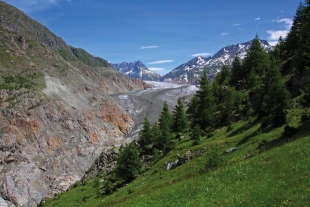 The melting Aletsch glacier in Switzerland: natural process or human intervention?
The melting Aletsch glacier in Switzerland: natural process or human intervention?
Climate change: what climate change? is the title of the new book by Pier Vellinga, a founder member of the IPCC and a successful fundraiser for climate-related research programmes. From the title you might think: Oh, so there isn't a problem? And indeed, the book eschews alarmist language, which makes a nice change in a polarized climate debate. But when you look closer, you see, above all, missed opportunities.
It is a pity that Vellinga has become so categorically committed to the IPCC standpoint, because that blinds him to several important issues. He fails to see that in spite of the fact that human beings have emitted almost one hundred particles of CO2 per million in the atmosphere, the consequences of this are still absolutely impossible to prove. The IPCC bases its evidence largely on the influence of human beings on temperature changes in the last fifty years, yet in spite of the continuous rise in CO2 levels in the atmosphere, in half of those years the temperature has either stayed the same or gone down. He also misses the extent to which the temperature fluctuations of the last century run parallel with the large-scale but unexplained internal oscillations of the oceans, particularly the Pacific Decadal Oscillation. The average global temperature of recent decades is lower than that in the middle ages, when there was still no question of CO2 emissions. In fact, the glaciers were smaller in Roman times than they are now, while the sea level is rising no faster than it did last century. So what do you mean, climate change?
In the last warm period, between the last two ice ages, the sea level was indeed six metres higher than it is now, probably because the Greenland ice cap had largely melted at that point - although without any human intervention.
At the end of the last ice age, ecosystems migrated northwards almost three times as fast as they are doing now, and if plants and animals are now having trouble adapting, that is not because it is getting warmer, as they are used to that, but because we have destroyed their habitats.
Yes, says Vellinga, but you can get tipping points at which it can suddenly all go wrong. But here he forgets that at tipping points, it can tip either way: according to prominent astrophysicists, it is absolutely not ruled out that instead of a warming up of the climate, we could be on our way to a new mini Ice Age. But Vellinga says the influence of the sun is a fable. Hardly a scientific way of debating.
'What is really going on?' asks Vellinga rhetorically at the beginning of his book. I would say, read De Staat van het Klimaat [The State of the Climate], by Marcel Crok, and you will find out.
Salomon Kroonenberg, professor of Geology at the Technical University of Delft and author of the book: De menselijk maat: de aarde over tienduizen jaar [The human scale: the earth ten thousand years from now].

























